FW
Outlook Plus Latin America was held in Brazil fro, March 7 to 9, 2017. This event covers the nonwoven personal care industry. There were presentations on market, product, and technology intelligence for hygiene and personal care. Market leaders in the nonwoven and film markets for these products shared their vision of the future. Regional demographic and consumer trends of relevance to the industry were highlighted. A session was dedicated to the use of nonwovens in healthcare and infection prevention applications and future opportunities.
More than 270 participants joined the conference and more than 25 companies took the opportunity to promote their products and services through tabletop exhibits. Nonwoven fabrics are broadly defined as sheet or web structures bonded together by entangling fiber or filaments (and by perforating films) mechanically, thermally, or chemically. They are flat, porous sheets that are made directly from separate fibers or from molten plastic or plastic film. They are not made by weaving or knitting and do not require converting the fibers to yarn.
Nonwoven fabrics provide specific functions such as absorbency, liquid repellency, resilience, stretch, softness, strength, flame retardancy, washability, cushioning, filtering, bacterial barriers and sterility. These properties are often combined to create fabrics suited for specific jobs. They can mimic the appearance, texture and strength of a woven fabric, and can be as bulky as the thickest paddings.
The global luxury apparel market is expected to expand at a CAGR of 13.2 per cent up to 2024. The market is segmented into leather, cotton, denim, silk, and others. Cotton holds a dominant share of 35.87 per cent. Cotton is ideal for hot and humid weather. The fiber has high absorbency, comfort, and is breathable. High cotton production in India and China has made Asia Pacific a frontrunner in the global market.
Leather is the next emerging segment in the global market. This material is being preferred due to its durability and ability to myriad designs that characterize high fashion. The expensive nature of leather also makes it a fit for luxury brands, who work on the premise of premium pricing. Silk is also gaining significant momentum due to its smooth texture, softness, and the elegance it bestows on the overall design. Production of silk in India and China has lent an impetus to the luxury apparel market of the Asia Pacific.
Europe has a strong footing in the global market due to the presence of several luxury brands and houses that have been in the business for several decades. Some key players operating in the global luxury apparel market are: Versace, Prada, Dolce and Gabbana, Burberry, Louis Vuitton, Armani, Ermenegildo Zegna, Ralph Lauren and Hugo Boss.
About 2.5 million workers in India’s leather industry toil and suffer. They work long hours with toxic chemicals for poverty wages, making shoes and clothes for western brands. Leather industry hubs like Agra, Tamil Nadu and Kolkata supply hides, leather, garments, accessories and footwear for export.
Employment is created through the growth of large-scale export centers. But accidents regularly occur. Machine operators get trapped. Workers cleaning underground waste tanks suffocate from toxic fumes or drown in toxic sludge at tannery premises. The workers include women and children.
In small, unregulated factories, workers have no social security cover such as state health insurance or pension and earn a tiny fraction of the products' global price. India is the world’s second largest producer of footwear and leather garments and almost 90 per cent of India's footwear exports go to the European Union.
Tannery workers often suffer fever, eye inflammation, skin diseases and cancer as they work with toxic chemicals and rarely have any safety training or protection. Dalits and Muslims make up the majority of the workforce. It’s necessary for brands to increase the traceability and transparency of their supply chains up to the level of tanneries and subcontractors.
"Business program of Mercedes-Benz Fashion Week has been set up as a two-day international conference Fashion Futurum. Panel discussions, workshops and presentations were launched in several zones of the Central Exhibition Hall Manege."
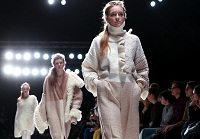
Business program of Mercedes-Benz Fashion Week has been set up as a two-day international conference Fashion Futurum. Panel discussions, workshops and presentations were launched in several zones of the Central Exhibition Hall Manege.
In the conference room Craig Arend, founder of Altamira NYC (USA), VR and AR expert, told the audience how VR technologies could be applied in retail. 3D videos and augmented reality bring new consumer experience: one can look at the product, try or test it and imagine it in different conditions. VR device that literally gives an opportunity to taste a meal without actually tasting it is already a reality. All you need is the objects printed on 3D printer, virtual environment, diffuser with an aroma and imitation of the effect of moving jaws. The speaker pointed out that virtual reality would soon become as simple and mundane as the use of telephone. Obviously, these technologies will be in demand in on-line stores for a detailed but distance introduction of a product to the client, and in demand with those retailers who look into the future and search new ways of interaction with the audience.
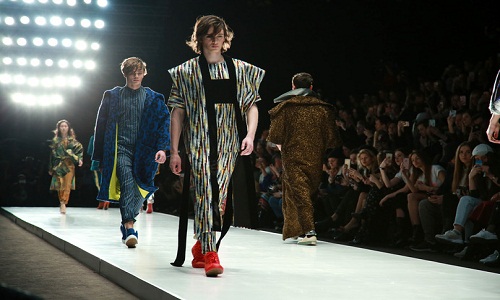
The next on the agenda was the panel discussion Future Jobs in Fashion: Fashion Professions Foresight, Expectations and Requirements. Representatives of the European institutions educating specialists of fashion industry discussed what contemporary education should be like and what professions would be in high demand in that field. Among the participants of the panel discussion were Sylvie Ebel, Executive Director, L’Institut Francais de la Mode (France); Danilo Venturi, Dean, Polimoda (Italy), Covadonga O’Shea, Founder, ISEM Fashion Business School, best-selling author (Spain). Tatiana Rivchun, Associate Dean, School of Design, Higher School of Economics (Russia), moderated the discussion. Speakers shared the view that the most productive studying method was the project work. Particularly participation in the project gives an understanding how production works, how to improve in communications, how the team work with other professionals is constructed. Bright personality and a good team player are what the employers are looking for. Apart from designers and production experts, the profession of fashion manager is in high demand and large companies offer opportunities for their professional development.
David Monteith, Fashion & Apparel Director at Flextronics (USA), devoted his workshop to the possibilities of synthesis of technologies and fashion. Studying fashion in a broad sense, as an array of prestigious objects, we can see that new technologies are already a part of it: smart accessories, fitness wear, watches and jewelry. Wearable technologies are one of the profiles of the company represented by David. The second direction, but not the least important one, is the technological advancement of the production process. Fast fashion, increase of production costs for clothes in China, demand for an individual approach in producing fashion for every particular client, set new tasks for the world of technologies. Many acute issues that fashion is facing today could be solved by production robotization. Hi-tech fabrics and accessories that can be status indicators and at the same time make one's life easier - it can all become a part of Haute Couture fashion provided experts in technologies and experts in aesthetics interact correctly and efficiently.
The innovations topic was continued by Giusy Bettoni, CEO at C.L.A.S.S. Eco Textile Library (Italy). Eco Textile Library was established by a group of companies from different countries. It works with the fashion houses and factories, aligns communication between them for the sake of ecological production of fabrics. Recycling of waste ends and use of newly discovered raw materials can save water resources and reduce carbon dioxide emissions. Sustainable development as well as eco-production is something that should be supported, something that should be described to the clients for them to become aware of the new value. Guisy also advocated the increase of transparency in the production cycle: the consumer must know what he or she buys, consumers have the right to make a conscious choice.
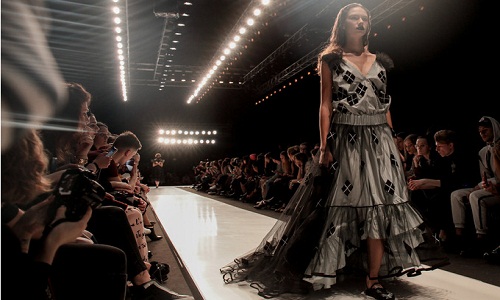
The following experts participated in the discussion Fast Production for High-End Fashion: How does it Change the Industry: Geoffrey Willis (CEO, Trigon Select Ltd (UK), Mark Jarvis (Managing Director at World Textile Information Network (UK), Svetlana Andrianova, President of Company FARADEI CJSC, Filippo Ceroni, CEO of the Italian company Grazia Bagnaresi (Italy). Evgeny Kovnir, Deputy Director at Young Professional, ASI (Russia) conducted the talk with participants. Smart management can speed up the production processes; it includes the use of 3D printing and work in several directions simultaneously. Mark Jarvis expressed his assurance that the reverse process was also inevitable presupposing the slowdown of fashion and growing demand for customized products.
Giualia Pirovano, Group Market Director at Instituto Marangoni (Italy), told the audience about Talent Sourcing in the Fashion Industry. Setting Italian fashion industry as an example, the speaker shared how to succeed in the world of marketing and how talent sourcing and promotion of young talented designers was proceeded in Italy. She also responded to the question about the possible partnership of Russian designers with Italian market. 'Russian fashion has deep roots in spite of the fact that it is not so famous. We are ready to cooperate and share experience with the young Russian designers', underlined Pirovano. 'We invite them to come either to Milan or to Paris to the French school.' Natalya Pochinok, Rector of the Russian State Social Studies University, talked with Giulia.
The question about possible support of the young designers was brought up and the speaker gave a detailed answer: 'It is rather hard to get into the world of fashion because it is very competitive. We motivate young designers to take part in international events. There is a large number of festivals and fashion weeks but is hard to get through. National Chamber of Italian Fashion coordinates such events and arranged three of them: within 10 years we have been selecting the best designers among 200 people and proceeded with their promotion. We selected 30-35 designers and covered expenses for showroom rent, placed funds for advertising, provided contacts of the fashion houses, fabrics manufacturers and suppliers.' Apart from that, Pirovano highlighted the importance of support of the young designers on the state level.
The dialogue was followed by another public talk with Mark Jarvis, Managing Director at World Textile Information Network (UK). It was devoted to technologies and technology disruption in value chain. In the presentation, Mark Jarvis showed how digital technologies were applied in the fashion industry and gave a brief overview of the brands that offered their clients the opportunity to personalize the selected garments. 'What we observe is the perfect storm: there are demands coming from people and computers and technologies offer possibilities to respond to those demands. At the moment digital technologies exist apart from each other but soon they will be united in one space, it will happen, it is just a matter of time,' said the speaker.
David Monteith, Fashion & Apparel Director at Flextronics (USA), Amanda Parkes, Chief of Technology and Research at Manufacture NY (USA) and Dmitry Kolobov, Director of the Department on Development of the Industry of Socially Minded Goods in the Ministry of Industry and Trade of the Russian Federation discussed the following milestone in the fashion industry: Smart Clothing for People with Disabilities. Sergey Karnaukhov, Head of the Federal Project Alliance of Russian Art Engineers, Associate Professor RANEPA (Russia) was the moderator of the discussion. In this fashion direction, the focus is not only on the aesthetics but also on comfortable characteristics and usability. Companies dealing with clothes production for people with disabilities work very closely with the clients. Manufacturing of special clothes requires attention and precision. Embedding electronic devices (for diagnosing the health state and improving mobility) into costumes is the issue that manufacturers of such brands are trying to solve. However different approaches are possible in design: from modelling familiar visual volumes to decoration of artificial limbs. Positioning issues are also still on the agenda.
The panel discussion Fashion is Next Hot Spot for Investments included the following participants: Alexander Korchevsky, Partner at 12BF Global Ventures, Irina Dyadyunova, CEO at Russian Fashion Council and Kirill Tischenko, representative of Investment Dept at Skolkovo Foundation. Speakers talked on the subject of financing designers, about the necessity to forecast risks and analyze fashion markets independent of the scale of the project. The investor should be aware of the market niche to be occupied by designer and the brand so that he could see the perspectives. Irina Dyadyunova raised an issue about financial support to Russian designers with small production facilities, mentioned the specifics of work with such designers and common competition rules.
The question - Why Retailers Should Have an Innovation Program? - was answered by Scott Emmons, Head of the Innovation Lab, Neiman Marcus (USA). A great number of applications was created to simplify communication between the world of fashion and consumer. For instance, Memory Mirror, Snap. Find. Shop, Alerttec or the brand new application Inside by Powerfront. 'I would like to use this project to change the communication paradigm with the Internet client,' shared Scott Emmons. He also touched upon the subject of customized approach to shopping and advantages of the innovation programs that give the client an opportunity to get detailed information in the shortest possible span of time in regards of the appealing brand.
General Director of Be-in.ru Alexey Bajenov talked with Michael Burke, Head of Industry, Fashion, Sports & Toys, Google (USA) about the correlation of the role of glossy magazines and social networks in creating an image and in retail. Speaker provided statistical data and mentioned that today 75% of all purchases were done under the influence of Internet. Contemporary consumer cannot simply come to the store, talk to the sales manager and try on an item. He/she avoids consultants, conducts a search and makes a decision before going into a store. Images from glossy magazines are far from real desires of a particular consumer that is why they use search systems. Google became a tool for direct sales; it helps in collecting information about interests of the user, besides there is search engine advertising. Instagram has also become an important tool with the critical mass of popular bloggers. Now it is an image platform, one cannot shop there but can study the brands closer. Social networks provide opportunities to build a direct connection with the client at the same time pushing out the gloss and reducing costs on retail.
During the panel discussion Incubation of Fashion Tech the following experts shared their experience: Don Lim, Head of the Center for Creative Economy and Innovation (South Korea), Garry Stewart, Director at Wayra (UK) and Arseniy Uralov, CEO at Steelup.ru (Russia). Moderator of the discussion was Ekaterina Inozemtseva, Vice-President at Skolkovo Foundation (Russia). Don Lim shared his vision and told that technology should first be launched, then offered and only afterwards the demand growth could be expected. Fashion industry has good chances to become a platform for launching new technologies. Garry Stewart pointed out the possibility of cooperation with big players of the market that can draw attention of the audience to the new smaller companies. Arseniy used his infrastructure project as an example and demonstrated how incubator can assist in finding the sales market and in attracting investors.
COO Dr. Claudio D. Martelli told about the work of his company Trigon Select, Ltd (UK). In conditions of fast fashion managers have to deal with multiple types of demands. There is no time left for selecting the right suppliers. Trigon Select unites experts who have been working in the field of clothes manufacturing for a long time. Company deals with standardization of evaluation processes of production. Experts from Trigon Select go to a factory to any part of the world, study the economic profitability, equipment, qualification of employees and many other important aspects. The result of their work is regularly refilled global rating of suppliers. After completing the research and establishing the rating value, the company conducts SWOT-analysis and gives development recommendations.
Panel discussion System Disruption: Do Fashion Weeks Have a Future completed the first day of the international conference Fashion Futurum. The following experts were on board: Pascal Morand, Executive President, French Federation of the Haute Couture and Pret-a-porte (France), Xiaolei LV, Vice Secretary General of Shanghai Fashion Week (China) and Alexander Shumsky, Executive President of Russian Fashion Council (Russia). Pascal Morand noted that fashion weeks are icon events that reflect the state of the Russian fashion industry. Xiaolei LV underlines the importance of constant reinforcement of market positions and the importance of finding the target audience. Alexander Shumsky talked about the establishing of a business model and importance of a concept. He also mentioned how critical it is to calculate the process, which will give the designer opportunity to arrange individual fashion shows.
Fifth day of Mercedes-Benz Fashion Week Russia started with the fashion show from Tako Mekvabidze. Fall-Winter collection 2016/17 was devoted to the Beautiful Era. DNA of Tako Mekvabidze brand is complicated structure of the looks and multiple garments. Perfect female dresses with ruffles rich in genuine patterns and glittering waist band, gleaming satin, delicately sparkling in the light, beads, the thinnest lace on half-transparent blouses, deep neck lines - exceptional monochrome color palette and textures of the fabrics once again highlighted the fragility of the female nature.
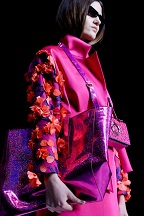
Fifth day of Mercedes-Benz Fashion Week Russia started with the fashion show from Tako Mekvabidze. Fall-Winter collection 2016/17 was devoted to the Beautiful Era. DNA of Tako Mekvabidze brand is complicated structure of the looks and multiple garments. Perfect female dresses with ruffles rich in genuine patterns and glittering waist band, gleaming satin, delicately sparkling in the light, beads, the thinnest lace on half-transparent blouses, deep neck lines - exceptional monochrome color palette and textures of the fabrics once again highlighted the fragility of the female nature. Fashion shows from Tako Mekvabidze are the mixture of the past and the present.
In the Fall-Winter collection, Anastasia Dokuchaeva denies common standards. Brave design goes hand in hand with bright colors, metallic finishing, jacquard fabrics as well as combination of sport and chic - glamorous jackets with belts, baggy shoulders, pajama costumes, flowers scattered on certain elements, all represent extraordinary ideas of the new world brought into life.
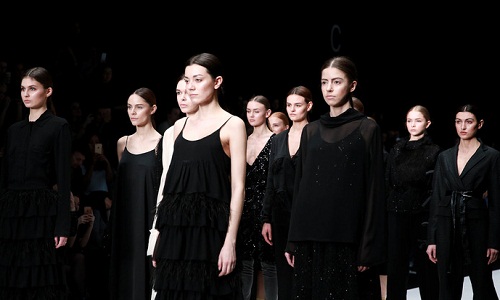
Collection SENSUS COUTURE is the constant search for something new. Every look takes you to a separate transcendent space and offers to try unexplored facets: space half-transparent cloak dresses, gleaming bombers, sparkling masks intermixed with mystic images and contemporary vision of the real world - neat lace jumpsuits, black and white two-piece suits, along with the coats and jackets with delicate details - bright and monochrome embroidery. The collection however follows the precise proportion and is performed in the calm color shades - emerald green, brown, white and black.
Fall-Winter collection 2016/17 from designer KSENIASERAYA was made in collaboration with the artist Anna Mokhova and inspired by the history of discovering of the Arctic region and nature's phenomena so typical for that territory. It can be traced in the geometric shapes, reserved colors and textures - imitation of crystallization of sea salt on dresses, patterns of local inhabitants as well as in cozy sweaters with 3D knitting patterns. Color palette of the collection is the smooth shift from the colors of soil and water to light shades - dark brown, airy blue, beige, powder beige and natural white.
Artem Shumov Fall-Winter 2016/17 male collection openly manifested military themes. Designer approached Russian history and break of the society. Hence, the face paint on his models. Loose shapes, draping, emphasized neglect - these attitudes could be seen in the outwear, jumpsuits, sport chic costumes. Man in clothes from Artem Shumov is the universal trendy soldier, serving the high style.
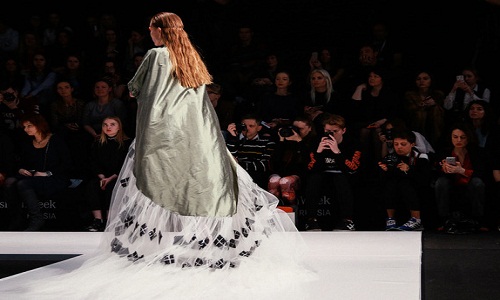
In the Fall-Winter collection the conceptual brand I V K A dressed the girls into familiar baby doll garments with the queen's hems. Childish dresses, transparent, pink with tender sleeves in flounces, shoes imitating tip-toeing, all this is just a foundation for a dramatic contrast. Models walked the catwalk fast, with crosses hands and looking from under the brows. Rebellious and childish attitudes are mixed in the white flowers on black net fabric, in loose sleeves of fur and feathers, attached to the straight simple dresses.
Collection from sisters Macharashvili for their brand MACH&MACH was distinguished by the garnish shades of pink - from the explosive fuchsia to strawberries with cream. Among the details - fur slippers, futuristic heals and glittering suitcases in grapes green and canary yellow with a steel ring holder that highlighted the gleam of leather skirts. Real thrill came with the half-transparent floor-length dresses and 3D patches in shapes of flowers on the coats and jumpsuits made of aquamarine blue jersey.
Designer IGOR GULYAEV employed theatrical performance for his show. The collection featured hallmark of the brand - provocative fur that perfectly creates a never-forget fatale image. Every fold in the multi-layered look referred to the luxury chic. Maxi dresses complemented with luxurious hats, bowlers and top hats, suits in colors of fluid gold and silver as well as garments with initials of the designer.
The presentation corner featured brand YULIA KRASNYANSKAYA and two new collections - fragrance and tulip. The designer uses pearls and Swarovski crystals to bring her design fantasy into reality, the shapes and colors build a delicate aesthetic look.
A separate venue, State Historic Museum, hosted a presentation from TSIGANOVA - 20 Shades of Red. In the foundation of the collection - garments from natural fabrics, united by the familiar designer's style, embroidered with the use of precious and semiprecious stones, beads, pearls, golden and silver threads. Apart from the fashion show, the exhibition of paintings by Russian traveler Fodor Konykhov was organized in the museum.
"Fashion Futurum International Сonference aims to develop a new approach to fashion in Russia. The Conference is a platform for both Russian and international industry leaders, visionaries and key fashion players who share their experiences and views on the current state of fashion industry around the world and its role as a driver of creative economy."
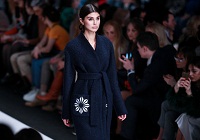
Fashion Futurum International Сonference aims to develop a new approach to fashion in Russia. The Conference is a platform for both Russian and international industry leaders, visionaries and key fashion players who share their experiences and views on the current state of fashion industry around the world and its role as a driver of creative economy.
On March 16-17 2017 over 30 world fashion industry leaders from 9 countries will meet in the very center of Moscow to discuss contemporary trends and main challenges of the industry. Fashion Futurum 2017 is devoted to the transformation of the fashion industry under the impact of scientific and technological revolution. Fashion Futurum's visioners will address the theme of confrontation between new media and glossy magazines, changing consumer behavior, e-Commerce features, the phenomenon of eco fashion world and other trends of fashion industry.
The sessions of the day 1:
1. Future Jobs in Fashion: Fashion Professions Foresight, Expectations and Requirements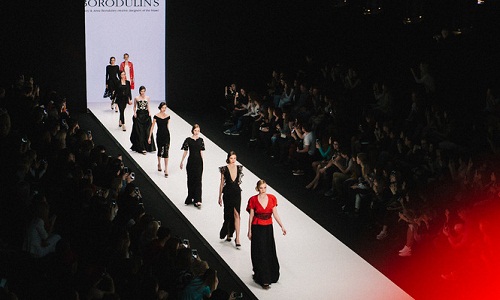
2. VR-commerce: will Virtual and Augmented Reality Affect E-Commerce in Fashion?
3. Modern Craftsmanship: Merging Technology and Fashion
4. Fast Production for High-End Fashion: How Does It Change the Industry?
5. Smart Materials and Smart Innovations: The Future of Fashion
6. Fashion’s Next Frontier: Smart Clothing for People with Disabilities
7. Talent Scouting in the Fashion industry
8. Perfect Storm: Technology Disruption in the Value Chain
9. Fashion is Next Hot Spot for Investments
10. Why Retailers Should Have an Innovation Program?
11. Incubation of Fashion Tech: Global Experience
12. The End of the Glossy Era: How New Media Drive Sales in Fashion
13. Future of Sourcing in Fashion
14. System Disruption: Do Fashion Weeks Have a Future?
Key speakers of the day:
SYLVIE EBELExecutive Director, L’Institut Francais de la Mode (France)
DANILO VENTURIDean, Polimoda (Italy)
COVADONGA O’SHEA Founder, ISEM Fashion Business School, best-selling author (Spain)
TATIANA RIVCHUN Moderator, Associate Dean, School of Design, Higher School of Economics (Russia)
CRAIG AREND VR/AR expert, Founder of AltamiraNYC (USA)
DAVID MONTEITH Fashion & Apparel Director, Flextronics (USA)
MARK JARVIS Managing Director, World Textile Information Network (UK)
GEOFFREY WILLIS CEO, Trigon Select Ltd (UK)
SVETLANA ANDRIANOVA President, Company FARADEI CJSC (Russia)
FILIPPO CERONI CEO, Grazia Bagnaresi (Italy)
EVGENY KOVNIR Moderator, Deputy Director, Young Professionals, ASI (Russia)
GIUSY BETTONI CEO, C.L.A.S.S. Eco Textile Library (Italy)
DAVID MONTEITH Fashion & Apparel Director, Flextronics (USA)
AMANDA PARKES Chief of Technology & Research, Manufacture NY (USA)
DMITRY KOLOBOV Head of Department of Socially Important Products, Ministry of Industry and Trade (Russia)
SERGEY KARNAUKHOV Moderator, Head, Alliance of Russian Art Engineers, Associate Professor, RANEPA (Russia)
GIULIA PIROVANO Group Market Director, Istituto Marangoni (Italy)
MARK JARVIS Managing Director, World Textile Information Network (UK)
JEFFRY ARONSSON Founder and CEO, Aronsson Group LLC (USA)
ALEXANDER KORCHEVSKY Partner, I2BF Global Ventures (Russia)
IRINA DYADUYNOVA Executive director, Russian Fashion Counsil (Russia)
KIRILL TISCHENKO Moderator, Investment Dept., Skolkovo foundation (Russia)
ALEXANDR GALITSKIY SCOTT EMMONS Head of the Innovation Lab, Neiman Marcus (USA)
ANDREY DEYNEKO DON LIM Center for Creative Economy and Innovation (South Korea)
GARY STEWART Director, Wayra (UK)
EKATERINA INOZEMTSEVA Moderator, Vice-President of Skolkovo Foundation (Russia)
MICHAEL BURKE Head of Industry, Fashion, Sports & Toys, Google (USA)
ALEXEY BAZHENOV Moderator, Founder of Be-in.ru DR. CLAUDIO D. MARTELLICOO, Trigon Select Ltd (UK)
PASCAL MORAND Executive President, French Federation of the Haute Couture and Pret-a-porter (France)
XIAOLEI LV Vice Secretary General, Shanghai Fashion Week (China)
ALEXANDER SHUMSKY Executive President, Russian Fashion Council (Russia)
The sessions of the day 2:
1. Protecting Intellectual Property in Fashion Industry on Global Markets
2. IT Solutions and Mobile Apps for Fashion Brands: Is It a Game Changer for Fashion Business?
3. Brand protection measures 4. Sustainability: Ethical Fashion Rules the World
5. The Future of Design. Fashion is Included 6. Fashion is Next Hot Spot for Investments
7. The Cross-Border Market Opportunity: Today’s Growth Rocket 8. Only Designers Will Stay: Creative Future of The Fashion Industry
9. The Winning Model of Spanish Fashion Industry
10. Upgrading Traditional Retail: Creating a Fluid Shopping Experience
11. Acceleration Models for the Fashion Industry
12. Local Becomes Global: How National Brands Can Succeed on the Global Marketplace
13. A FashionTech Start-up is Just a Start-up: What Rules to Follow and What to Break
14. Italian Young Designers Say CIAO! to the Fashion System
Key speakers of the day:
ALBERTO CRIVELLIPartner, AMTF Avvocati (Italy)
LUDMILA NOVOSELOVA Chairman of Intellectual Rights Court, Doctor of Law (Russia)
EVGENY PEN CEO, Intellectual Property Depositary (Russia)
MAKSIM DYSHLYUK EDDIE MULLON CEO of Launchmetrics, Founder of Fashion GPS (USA)
VICTORIYA PAVLOVA GIUSY BETTONI CEO, C.L.A.S.S. Eco Textile Library (Italy)
PIIA LEHTINEN President of the Board, Design District Helsinki (Finland)
MARINA KOKORINA President, RusEcoModa (Russia)
COVADONGA O’SHEA Moderator, Founder, ISEM Fashion Business School, best-selling author (Spain)
KARIM RASHID Designer (USA)
MARVIN LIAO Partner, 500 Startups (USA)
AMANDA PARKES Chief of Technology & Research, Manufacture NY (USA)
EDDIE MULLON CEO of Launchmetrics, Founder of Fashion GPS (USA)
KONSTANTINE KARCZMARSKI Moderator, Advisor to Innovations Department, ITMO University (Russia)
ANNA KLINSKOVA Vice-President Sales and Marketing, DHL Express (Russia)
OKSANA SHPITALNIKOVA DHL Express (Russia)
ALEXANDER KIBOVSKY Minister of Government of Moscow, Head of Department of Culture, Moscow Government (Russia)
KARIM RASHID Designer (USA)
PRINCESS BEATRICE D’ORLEANS President of the Spanish Luxury Association, Ambassador of Dior (Spain)
DMITRY PESKOV Director, Young Professionals, ASI (Russia)
ALEXANDER SHUMSKY Moderator, President, Russian Fashion Council (Russia)
CARLOS ESPINOSA DE LOS MONTEROS High Government Commissioner for the Spain Brand,Vice-President of Inditex (Spain)
ALEXEY BAZHENOV Moderator, Founder of Be-in.ru MICHAEL BURKE Head of Industry, Fashion, Sports & Toys, Google (USA)
SCOTT EMMONS Head of the Innovation Lab, Neiman Marcus (USA)
ALLA VERBER Vice-President, Mercury Russia, Fashion Director, TSUM Department Store (Russia)
ANNA KLINSKOVA Vice-President Sales and Marketing, DHL Express (Russia)
ARINA SLYNKO GARY STEWART Director of Wayra (UK)
EKATERINA SHAKINA Head of Projects, ASI (Russia)
VICTOR EVTUHOV State Secretary, Deputy Minister of Industry and Trade of the Russian Federation
CARLOS ESPINOSA DE LOS MONTEROS High Government Commissioner for the Spain Brand, Vice-President of Inditex (Spain)
JEFFRY ARONSSON Founder & CEO, Aronsson Group LLC (USA)
PASCAL MORAND Executive President, French Federation of the Haute Couture and Pret-a-porter (France)
IGOR BARTSITS Moderator, Director of IPACS, RANEPA (Russia)
MARVIN LIAO Partner, 500 Startups (USA)
ELENA PRIVALOVA OLIVIA SPINELLI Fashion Coordinator at IED Moda Lab, Istituto Europeo di Design
GIORGIA LAURETI & PARISI LUCIANO IED Milan Graduates
OLGA MYELKOVA IED Group Area Manager
Vietnam’s textiles export earnings in the first six months of this year rose 10.26 per cent compared to the same period last year says Vietnam National Textile and Garment Group (Vinatex). The US, South Korea and the European Union were the biggest importers of Vietnamese products, posting growth rates of 11.01 per cent, 8.33 per cent, and 8.2 per cent against the same period last year.
Vietnam is the fourth largest textile exporter in the world. The sector will need to make additional efforts to seek new markets and opportunities, and establish partnerships with major groups to be able to sign high-value orders in the remaining months of this year.
Vietnam’s leather and footwear industry expects to raise its export value by 10 per cent this year. Footwear currently ranks fourth and suitcase-bag-briefcase ranks tenth among Vietnam’s top ten foreign currency earners. To achieve the target, the leather and footwear sector needs to boost technological innovation, invest in new equipment and modernise existing equipment, expand the production scale of domestic enterprises to increase productivity as well as improve the quality of products.
Another promising element is the Vietnam-European Union free trade agreement, which will take effect in 2018 and afford Vietnamese footwear makers more opportunities to boost exports.
The textile sector in India contributes more than five per cent to India’s GDP and 14 per cent to overall index of industrial production. The sector is expanding even though it has been facing numerous challenges. The sector comprises small-scale, medium-scale, large-scale, non-integrated, spinning, weaving, finishing, and apparel-making firms and enterprises.
The textile and apparel industry is broadly divided into three segments. One, yarn and fiber (including natural and manmade), mainly made up of cotton and jute; second, processed fabrics (including woolen textiles, silk textiles, jute textiles, cotton textiles and technical textiles); and third readymade garments and apparel.
The unorganized sector includes handlooms, power looms, hosiery, knitting, readymade garments, khadi, carpets and handicraft manufacturing units. The organized mill sector comprises spinning mills and composite mills where spinning, weaving, and processing activities happen.
Exports of Indian textile and apparel products have been growing with the EU and the US as major export destinations. The basic strength of the industry in India is its strong production base of a wide range of natural fibers like cotton, jute, silk and wool to synthetic or manmade fibers like polyester, viscose, nylon and acrylic.
Overall production of manmade filament yarn has declined over the last few years, though production of viscose filament yarn and nylon filament yarn has increased correspondingly.
German clothing retailer C&A is examining partnerships and other types of outside investment as it develops a turnaround plan focusing on China and other emerging markets. Swiss-based COFRA Holding issued a statement in response to a report in Spiegel Online that C&A, which was founded in the 19th century and remains in family ownership, was close to being sold to a group of unnamed Chinese investors.
The company is committed to a successful, future-proof C&A business and as such at C&A it has embarked on a transformation and growth programme, says a COFRA Holding representative. The ongoing transformation of C&A includes an investigation of ways to accelerate in high growth priority areas. These included “China, emerging markets that could potentially include partnerships and other types of additional external investment.
C&A was founded as a confectionery business in 1841 by brothers Clemens and August Brenninkmeyer, and today runs more than 1,500 stores, employs 35,000 people and operates in 18 European countries. The business, controlled via COFRA by more than 1,000 descendants of the Brenninkmeyers, has struggled of late to compete with fast-fashion brands and online retailers. Caparros, formerly of German supermarket chain REWE, was hired as chief executive of C&A in mid-2017, replacing Philippe Brenninkmeijer in a break from the tradition of a family member running the company.
India may have a uniform unit of weight for cotton trade. One recommendation is buying should be in kilos or tons only since this would make pricing accurate. The step is a move towards more uniformity and transparency in the cotton trade. Different units of weight cause ambiguity and confusion for the exporters, who have to plan their purchases. Export orders have a plus or minus five per cent variation in the weight and one isn’t sure exactly how much cotton will be there in a bale — 160 kg or 165 kg.
So far, cotton has been traded in different weight units at different parts of the value chain in different growing regions in the country. Gujarat, the largest cotton producer, uses bales for cotton procurement from markets while kapas (raw, unginned cotton) is weighed in quintals. Ginned cotton is quoted in candies.
While farmers get the price based on quintal weight, the procurement at the market or mandis is quoted in bales. Nowhere in the world is cotton procurement quoted in bales. While the weight in India has been fixed at 170 kg for a bale, many states still have bales with 160 to 165 kg. Ginned cotton is quoted in candy, while exports take place in terms of tons.












